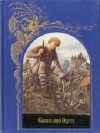The Islands of Chaldea - Diana Wynne Jones

The Islands of Chaldea is a bittersweet little book-mostly because it is Wynne Jones' last. It was published posthumously, and it wasn't completely when it was found, and thus it had to be completed by her sister, herself a children's author. It takes place in an alternate universe Great Britain, where all the countries are separated by water-but water is not the only thing that separates them. Culture does too-and a magical barrier put up by Logra (England) ten years before. It concerns a quest involving the heir to a powerfully gifted (in magic, of course) family named Aileen, and her companions-Ivar, a prince of Skarr (her Scotland), Aunt Beck, her aunt and a powerfully gifted wise woman, and Ogo, an stranded Logran-to take down Logra's barrier. Well, originally. They also pick up passengers from the three islands they visit in the meantime (Bernica, her representation of Ireland, Gallis, her representation of Wales and Lone, maybe a representation of Orkney and the Isle of Man).
The great thing about Chaldea is its world-the islands, and the companion animals that protect each. The protector (and the first one found) of Skarr is some sort of cat, nicknamed Plug Ugly by Aileen. Plug Ugly has a nasty talent for coming and going wherever and whenever he wants (including on a boat). The next found is Bernica's protector-a parrot named Green Greet. This parrot is owned by a monk named Finn, and it's never explained just how Finn got his parrot. However, both parrot and monk jump at the chance to take down the Logran barrier-it's affected everyone in all island. The guardian animal they find next is (obviously) Gallis' and it is (also obviously) a small red dragon-which makes sense, seeing as Wales' emblem is the red dragon (though perhaps a little more fearsome than Gallis'). This animal is owned by Aileen's cousin, on her father's side, who's a bit of a tinkerer. The final guardian is Logra's, and is a surprise.
I found the islands a wonderful treat, compared to the normal fantasy Britain nowadays (a more London-centric view, while this was almost Arthurian). Both Gallis and Bernica were extremely religious-in fact, it is said that in Gallis you cannot do anything without a priest breathing down your neck, but the Bernican monks tended to be a bit meeker. There was also a wonderful sideplot about a witch with a very Pinocchio-like ability to turn boys into donkeys.
The weakest sections for me were the end, as it was very un-DWJ to me. It wasn't twisty enough-not really. And when you're having one last ballgame in the mind of one of your favourite writers in the world-you want it to be as distilled as possible.
Rating: four and a half stars (if only for nostalgia's sake)






